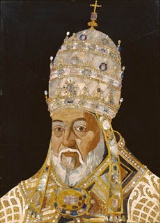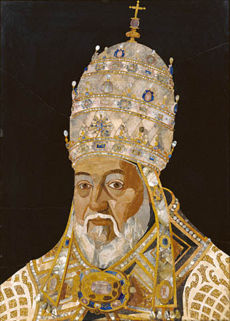
Caeca et Obdurata
Encyclopedia

Latin
Latin is an Italic language originally spoken in Latium and Ancient Rome. It, along with most European languages, is a descendant of the ancient Proto-Indo-European language. Although it is considered a dead language, a number of scholars and members of the Christian clergy speak it fluently, and...
incipit
Incipit
Incipit is a Latin word meaning "it begins". The incipit of a text, such as a poem, song, or book, is the first few words of its opening line. In music, it can also refer to the opening notes of a composition. Before the development of titles, texts were often referred to by their incipits...
, meaning the blind and obdurate perfidy of the Hebrews) was a papal bull
Papal bull
A Papal bull is a particular type of letters patent or charter issued by a Pope of the Catholic Church. It is named after the bulla that was appended to the end in order to authenticate it....
, promulgated by Pope Clement VIII
Pope Clement VIII
Pope Clement VIII , born Ippolito Aldobrandini, was Pope from 30 January 1592 to 3 March 1605.-Cardinal:...
on February 25, 1593, which expelled the Jews from the Papal States
Papal States
The Papal State, State of the Church, or Pontifical States were among the major historical states of Italy from roughly the 6th century until the Italian peninsula was unified in 1861 by the Kingdom of Piedmont-Sardinia .The Papal States comprised territories under...
, effectively revoking the bull Christiana pietas (1586) of his predecessor Pope Sixtus V
Pope Sixtus V
Pope Sixtus V , born Felice Peretti di Montalto, was Pope from 1585 to 1590.-Early life:The chronicler Andrija Zmajević states that Felice's family originated from modern-day Montenegro...
. Prior to 1586, Pope Pius V
Pope Pius V
Pope Saint Pius V , born Antonio Ghislieri , was Pope from 1566 to 1572 and is a saint of the Catholic Church. He is chiefly notable for his role in the Council of Trent, the Counter-Reformation, and the standardization of the Roman liturgy within the Latin Church...
's bull Hebraeorum gens sola (1569) had restricted Jews in the Papal States to Rome
Rome
Rome is the capital of Italy and the country's largest and most populated city and comune, with over 2.7 million residents in . The city is located in the central-western portion of the Italian Peninsula, on the Tiber River within the Lazio region of Italy.Rome's history spans two and a half...
and Ancona
Ancona
Ancona is a city and a seaport in the Marche region, in central Italy, with a population of 101,909 . Ancona is the capital of the province of Ancona and of the region....
.
The bull was a culmination of Clement VII's tightening of the anti-Jewish measures of his predecessors which began with his elevation to the papacy in 1592. The bull gave Jews three months to leave the Papal States (with the exception of Rome, Ancona, and the Comtat Venaissin
Comtat Venaissin
The Comtat Venaissin, often called the Comtat for short , is the former name of the region around the city of Avignon in what is now the Provence-Alpes-Côte d'Azur region of France. It comprised roughly the area between the Rhône, the Durance and Mont Ventoux, with a small exclave located to the...
of Avignon
Avignon
Avignon is a French commune in southeastern France in the départment of the Vaucluse bordered by the left bank of the Rhône river. Of the 94,787 inhabitants of the city on 1 January 2010, 12 000 live in the ancient town centre surrounded by its medieval ramparts.Often referred to as the...
). The main effect of the bull was to evict Jews who had returned to areas of the Papal States (mainly Umbria
Umbria
Umbria is a region of modern central Italy. It is one of the smallest Italian regions and the only peninsular region that is landlocked.Its capital is Perugia.Assisi and Norcia are historical towns associated with St. Francis of Assisi, and St...
) after 1586 (following their expulsion in 1569) and to expel Jewish communities from cities like Bologna
Bologna
Bologna is the capital city of Emilia-Romagna, in the Po Valley of Northern Italy. The city lies between the Po River and the Apennine Mountains, more specifically, between the Reno River and the Savena River. Bologna is a lively and cosmopolitan Italian college city, with spectacular history,...
(which had been incorporated under papal dominion since 1569).
For the Jews remaining within Rome, Ancona, or the Comtat Venaissin, the bull re-established mandatory weekly sermons. The bull also resulted in the relocation of Jewish cemeteries to Ferrara
Ferrara
Ferrara is a city and comune in Emilia-Romagna, northern Italy, capital city of the Province of Ferrara. It is situated 50 km north-northeast of Bologna, on the Po di Volano, a branch channel of the main stream of the Po River, located 5 km north...
and Mantua
Mantua
Mantua is a city and comune in Lombardy, Italy and capital of the province of the same name. Mantua's historic power and influence under the Gonzaga family, made it one of the main artistic, cultural and notably musical hubs of Northern Italy and the country as a whole...
.
The bull alleged that Jews in the Papal States had engaged in usury
Usury
Usury Originally, when the charging of interest was still banned by Christian churches, usury simply meant the charging of interest at any rate . In countries where the charging of interest became acceptable, the term came to be used for interest above the rate allowed by law...
and exploited the hospitality of Clement VIII's predecessors "who, in order to lead them from their darkness to knowledge of the true faith, deemed it opportune to use the clemency of Christian piety towards them" (alluding to Christiana pietas).
Three days later, on February 28, Clement VIII promulgated Quum Hebraeorum malitia, decreeing that the Talmud
Talmud
The Talmud is a central text of mainstream Judaism. It takes the form of a record of rabbinic discussions pertaining to Jewish law, ethics, philosophy, customs and history....
should be burnt
Book burning
Book burning, biblioclasm or libricide is the practice of destroying, often ceremoniously, books or other written material and media. In modern times, other forms of media, such as phonograph records, video tapes, and CDs have also been ceremoniously burned, torched, or shredded...
along with cabalistic works and commentaries, which gave the owners of such works 10 days to turn them over to the Universal Inquisition in Rome
Roman Inquisition
The Roman Inquisition was a system of tribunals developed by the Holy See during the second half of the 16th century, responsible for prosecuting individuals accused of a wide array of crimes related to heresy, including Protestantism, sorcery, immorality, blasphemy, Judaizing and witchcraft, as...
and subsequently two months to hand them over to local inquisitors.

